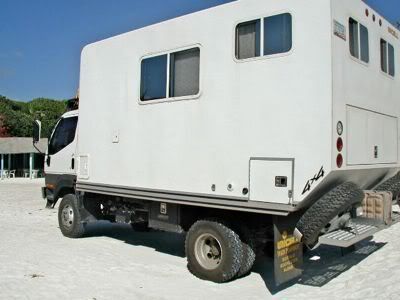Carnet de Passage explanation
We have just arrived back home to Prescott with our vehicle, the first time it has been in the US since October 2004. We will be posting another update on our website in just a few days.
Let me clear up any confusion regarding the bond required in Singapore and Malaysia. I used the term Bond rather than Carnet as a simplistic explanation. As many people are unfamiliar with the Carnet I felt that the term Bond would be more readily understandable. In fact, the other day when we crossed the border at Nogales the US Customs agents there did not know what a Carnet du Passage was and refused to sign it until we found a sympathetic supervisor who relented.
The Carnet du Passage allows travellers to temporarily import their vehicles without having to leave a cash deposit at the border. The Carnet is a guarantee for a foreign country that the vehicle will be re-exported within the time limit imposed by that country of duty free importation, usually a period of less than 18 months, and if the vehicle can not be re-exported, for example due to total loss, theft or sale, that all duties and taxes will be paid.
In order to obtain a Carnet, the owner of a vehicle is required to provide a financial guarantee based on the age and market value of the vehicle. Generally three types of guarantee are acceptable:
- Cash
- Letter of Credit from a bank
- Indemnity Bond
The cash option can be for a prohibitive amount of money if you travel with a new/newer vehicle as many countries require a guarantee of up to 150% cash of the vehicle’s value. Additionally, this cash amount is held in a non interest bearing account.
The Letter of Credit (LOC) is an option as you need only to pledge a bank account with funds equal to the amount of the LOC. The account can still accrue interest on your behalf. The fee for the LOC can be negotiated but is usually at least 5% of the value of the LOC, or a minimum of $1,000.00. The negative side of this approach is that many banks will only issue an LOC for a business entity and not for private individuals.
In some European countries it is possible to purchase an Indemnity Bond for a percentage of the value of the Carnet. This is similar to a Bail Bond, wherein you pay 10% of the total bail plus the pledging of property to cover the 90% remaining balance.
The Indemnity Bond is not currently available in the North America for the Carnet du Passage. It is available for the commerical ATA Carnet. However the ATA Carnet is not valid for temporary import of vehicles by an individual. We have heard of cases where the traveler was refused entry at the port with the ATA Carnet and had to arrange for the Carnet du Passage, all the while accruing port storage fees for their vehicle.
Don Greene
Adventure Learning Foundation
Americas Overland, The Driving Handbook
www.QuestConnect.org
www.AmericasOverland.net


